Say the words sharp-tailed grouse and most bird hunters think of the windswept prairies of the Dakotas, the Sand hills of Nebraska or perhaps the high lonesome of eastern Montana.

Historically though, seven subspecies of sharp-tailed grouse were found in two thirds of the lower 48 states from Michigan to California, Alaska and in the Canadian provinces from Quebec west to the Yukon Territories. The New Mexico sharp tail subspecies was declared extinct in 1952, leaving six, some with huntable populations and others reduced to only remnants of their former populations. Good populations of sharp tails still exist in the northern Plains states, eastern Montana and Alaska, as well the Intermountain West.
Many bird hunters are surprised that the Mountain West states of Utah, Wyoming, Idaho and Colorado boast huntable populations of sharp-tailed grouse. The subspecies found there is the Columbian sharp tail, first noticed and categorized as a different subspecies from the Plains sharp tail by none other than Lewis and Clark. Of those four states, Idaho is reported to have some of the most robust populations and the longest season. As of press time, the season runs from Oct. 1–31 with roughly the eastern third of the state open to hunting. And the daily bag limit is two birds per day, four in possession. While there are more commonalties among sharp tail subspecies than differences, there are some unique habits of the Columbian subspecies that can make hunting for them a challenge. At times, the Columbian subspecies can be found near ruffed grouse habitat.
Habits and Habitats
This story is from the {{IssueName}} edition of {{MagazineName}}.
Start your 7-day Magzter GOLD free trial to access thousands of curated premium stories, and 9,000+ magazines and newspapers.
Already a subscriber ? Sign In
This story is from the {{IssueName}} edition of {{MagazineName}}.
Start your 7-day Magzter GOLD free trial to access thousands of curated premium stories, and 9,000+ magazines and newspapers.
Already a subscriber? Sign In

Tail feathers - STANDARDS AND PRACTICES
\"An armed society is a polite society,\" the NRA says in one of its dicta, cribbed from Robert A. Heinlein, a 20th-century American science fiction writer.
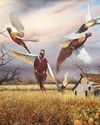
Day's End - IN PRAISE OF FENCEROWS
Driving north along the Hudson River, I gazed at a pastoral autumn scene: sere fields of faded yellow harvested corn, stubbly and broken amongst the clods of black earth, almost smooth from my vantage point. Spiky brown veins of wild growth marked barriers between plots. Occasionally, the gray bones of a mature oak rose among the brown shrubs to stand over the yellow fields. A sentry, keeping silent watch as white frost crystals slowly melted into invisibility.

That Time of Year Again
Without doubt. The most idyllic form of hunting in Ohio is seeking the woodcock. - Merrill Gilfallan, Moods of the Ohio Moons: An Outdoorsman's Almanac (1991)

I Don't Wanna'!
I'm an old hand at being retired, though - have been practicing for 25 years.
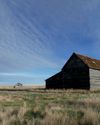
Hunting the Huns: Alberta's Big Sky Country
The prairies of southern Alberta are vast, beautiful and full of prime bird habitat. Crop fields are interspersed with abandoned farms, rolling hills are intersected by coulees and creek beds, and Hungarian partridge and sharptailed grouse occupy some of the best and most picturesque habitat on the continent.
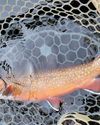
Side Dish - End of Season
Sporting trips are not only about sport, as many other experiences are discovered alongside. And my trip to Lakewood Camps in Maine was certainly just that.
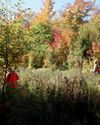
AN EXTENDED STAY
There is no reason to leave Michigan in the fall unless the opportunity of a cast and blast adventure at a historic sporting lodge in Maine comes calling.
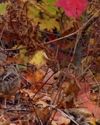
KEEP IT HANDY
If you think shooting a ruffed grouse on the wing with a shotgun is tough, try shooting one in flight with a still camera.
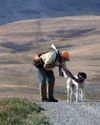
A Longtime Love Affair
It's possible to hunt your favorite birds in a lot of different places, I suppose, but I don't do that.
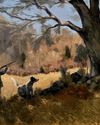
Profile of an Artist: Harley Bartlett
Harley Bartlett was born in 1959 near Pittsburg, Pennsylvania. However, having lived in Rhode Island for most of his life he considers himself a Rhode Islander.